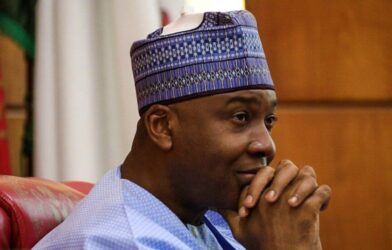Since the year 2020 when Imo State witnessed the so-called judicial ‘coup d’ `etat’ that unseated the then governor Mr. Emeka Ihedioha of the Peoples Democratic Party who was returned as the elected governor by the Independent National Electoral Commission as the winner of the 2019 gubernatorial election in Imo State, and installed Hope Uzodinma of the APC, Imo State has gone on to become a significant flashpoint of insurgency and violence that have resulted in the killing of hundreds of Imo State citizens and the gradual destabilisation of that once peaceful state.
It would be recalled that the Supreme Court’s judgment that saw the emergence of Mr. Hope Uzodinma who was returned as the number fourth at the 2019 gubernatorial election by INEC, led to the emergence of what most Imo State citizens perjoratively termed as ‘Supreme Court’s governor’.
Mr. Hope Uzodinma, a former Senator who represented Imo West senatorial zone at the National Assembly, didn’t find that terminology aforementioned, funny. The Imo state governor and his supporters denied that Hope Uzodinma could be described as the ‘Supreme Court’s Governor’, but insisted that the conclusion of the Supreme Court in the post-election litigation was justified. Hope Uzodinma repeated his claim to winning fair and square when last year he was returned as the winner of the gubernatorial election in which he is expected to serve for the last tenure.
This August of 2024, will however have another side to it for millions of Imo citizens who still doubted the credibility of that Supreme Court’s judgment that saw the emergence of Hope Uzodinma as governor after the Supreme Court torpedoed Emeka Ihedioha from office of governor after just 7 months.
This is because the public face of that controversial judgment of the Supreme Court Justice Kekere-Ekun will become the next Chief justice of Nigeria with the exit of the incumbent whose tenure remains one of the most tumultuous and ethically challenged epoch in the history of the judiciary in Nigeria. Ironically, even as Kekere-Ekun emerges as the CJN, politicians who lost last year’s gubernatorial election in Imo State are before the Supreme Court with appeals against the validation of Hope Uzodinma’s victory of last year’s poll.
As aforementioned, that Supreme Court’s Decision on Imo Governorship as even described by the leading coalition of pro-democracy Non-governmental institutions known as situation room which published an extensive article on January 21st 2020 and stated that the verdict rattled Nigerians.
The Coalition noted that on Tuesday, January 14th 2020, the Supreme Court nullified the election of Emeka Ihedioha of the Peoples Democratic Party (PDP) as governor of Imo State and declared Hope Uzodinma in replacement. Emeka Ihedioha had on May 29, 2019 been sworn in as governor. His election was challenged by three of the runner-up contestants in the Action Alliance (AA), the All Progressives Grand Alliance (APGA) and the All progressives Congress (APC).
The legal challenges to his election were dismissed at the tribunal and Court of Appeal levels. The matter went up to the Supreme Court on appeal, where it succeeded, with the Court giving judgment in favour of the APC candidate, Hope Uzodinma.
It recalled that the Supreme Court ruled that results from 388 polling units, which the APC candidate claimed were excluded from his vote count was now allowed. This upped Hope Uzodinma’s votes from the initially announced number of 96,458 votes to 309,753, surpassing Ihedioha’s tallied votes of 273,404. The Supreme Court however failed to provide sufficient details of its computation of numbers and what votes other candidates, including Ihedioha, who were on the ballot in the 388 polling units got. Indeed other additional details missing from the Supreme Court’s computation include number of registered voters in the polling units and integrity of the computations made in the said polling units.
Observers are however questioning the Supreme Court’s tallying and computation of votes. With several describing the decision as bizarre, Ihedioha’s ouster by the Supreme Court had led to nationwide protests across the country by PDP supporters and members of the public. The PDP had returned indirectly to the Supreme Court to seek judicial review of its decision but failed.
It would be recalled that the nation’s apex court declared Hope Uzodinma of the All Progressives Congress (APC) as the winner of the March 9 governorship election in the state.
In the unanimous judgment of the seven-member panel, read by Justice Kudirat Kekere-Ekun, the apex court agreed that results in 388 polling units were unlawfully excluded during the collation of the final governorship election result in Imo State.
Justice Kekere-Ekun said with the results from the 388 polling units added, Mr Uzodinma polled a majority of the lawful votes and ought to have been declared the winner of the election by the Independent National Electoral Commission, INEC.
The judge did not provide the details of the new votes scored by each of the candidates after the addition of the results from the 388 polling units.
Consequently, she voided and set aside the declaration of Mr lhedioha as the winner of the 2019 governorship election in the South-East state.
From then till now, it has been one violent attack or the other even as Imo State has snowballed into instability, persistent insecurity due to poor governance and the incapacity of the Imo State administration to resolve the matters that led to insurgency and the concomitant extrajudicial killings of hundreds of Imo State youths by security agents under the guise of waging a war on terror.
But this month is significant in the memory of Imo State citizens because the Supreme Court’s justice that read out the controversial verdict that brought the current Imo State governor Mr. Hope Uzodinma, will emerge as the Chief Justice of Nigeria and would become the second woman after Aloma Mukhtar to become the CJN.
It would be recalled that Justice Aloma Mukhtar who was the first female Chief Justice of Nigeria held the position between July 2012 and November 2014 when she retired.
Justice Olukayode Ariwoola, the incumbent CJN who assumed office on June 27, 2022, will formally bow out on Thursday, August 22, 2024, after attaining the mandatory retirement age of 70 years.
By judicial ranking, the 66-year-old female jurist is reportedly the most senior justice of the Supreme Court after Ariwoola.
Born on May 7, 1958, Justice Kekere-Ekun has spent 11 years on the bench of the apex court after her appointment as the fifth female Justice of the court in July 8, 2013.
She obtained her LL. B in 1980 from the University of Lagos and LL.M from the London School of Economics and Political Science in November 1983. She was called to the Nigerian Bar on 10th July, 1981.
From 1985 to 1989, she was in private practice and was later appointed a Senior Magistrate Grade II, Lagos State Judiciary in December 1989.
Justice Kekere-Ekun was appointed a judge of the High Court of Lagos State on July 19, 1996. She served as the chairman of the Robbery and Firearms Tribunal, Zone II, Ikeja, Lagos, from November 1996 to May 1999.
On September 22, 2004, she was elevated to the Court of Appeal on where she served in various Divisions and as the presiding justice of two Divisions of the appellate court (Makurdi and Aku) in 2011 and 2012, respectively.
She was elevated to the Supreme Court of Nigeria as the fifth female justice of the apex court and sworn in on Monday, July 8, 2013.
A life bencher and president of the International Association of Women Judges.
With this loaded profile, the doubts lingering in the minds of most people who expressed shock at how someone who came fourth at an election was then railroaded by the Supreme Court to the number 1, will no doubt hang on precariously in the consciousness of millions of Nigerians.
The expectations of Nigerians from the judiciary with the coming of Justice Kekere-Ekun as CJN this August is that the huge burden of ethical misfortunes bedevilling the judiciary as an arm of government would abate.
The United Nations Office on Drugs and crime (UNODC) issued a warning recently that Corruption in Nigerian judiciary is extensive. This is disconcerting and millions of Nigerians including those who view Justice Kekere-Ekun’s coming as a stark reminder of that controversial judgment on the Imo State gubernatorial election related litigation, expect her to take fundamental steps to stem the tides of pervasive corruption in the judiciary of Nigeria.
The UNODC says 20 per cent of those who had contact with the Nigerian judiciary were confronted with a request for the payment of a bribe. The United Nations Office on Drugs and Crimes (UNODC) says corruption is prevalent in the Nigerian judiciary.
A representative of the UNODC, Melissa Omene, said this recently at a judicial accountability event in Abuja.
Speaking on a 2019 survey that was conducted by the UNODC and the National Bureau of Statistics (NBS), Ms Omene said the survey “found that 20 per cent of those who had contact with the Nigerian judiciary were confronted with a request for the payment of a bribe. “Indeed, corruption in the Nigerian judiciary is extensive and both male and female judges are party to it.”Giving a comparative analysis of the issue, a UNODC study on gender and corruption in 2020, disclosed that “male judges are far more likely to be involved in bribe-seeking conduct than their female colleagues.”
The study said corruption amongst judicial officers had eroded “public confidence in the judiciary.”
Besides, whilst weighing in on the quality of justice dispensation by Nigerian courts, a lawyer, Jibrin Okutepa, blamed lawyers and judges for the loss of public confidence in the judicial system.
Mr Okutepa, a Senior Advocate of Nigeria (SAN) and a former member of the Legal Practitioners Disciplinary Committee (LPDC), said the country is in a moral decay.
The erstwhile Chairman of the board of the Nigerian National Human Rights Commission Mr. Chidi Odinkalu has written copiously warning about the consequences of massive corruption and nepotism in the nation’s judiciary.
We will therefore be watching to see to what extent the next CJN will re-engineer a comprehensive anti-corruption war within the justice system of Nigeria.
Emmanuel Onwubiko Writes From Abuja.















Comments are closed